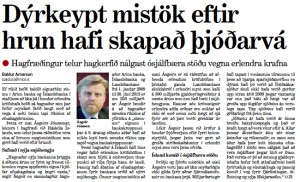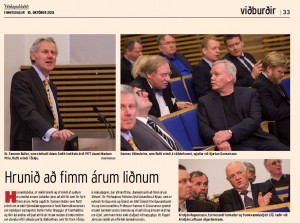In the well-attended international conference on the Icelandic bank collapse 7 October 2013, five years on, Dr. Eamonn Butler of the Adam Smith Institute, London, stressed that misguided government intervention, not least subprime loans in America and the soft monetary policy both of the American Fed and other central banks, was mostly to blame for the financial crisis of 2007–8. The right response was therefore not more of the same, increased regulation and intervention in the financial markets.
Professor Hannes H. Gissurarson of the University of Iceland pointed out that the Icelandic banks were not proportionally bigger than for example British or Swiss banks. The difference was, however, that the British and the Swiss banks, not to mention the Nordic banks, were bailed out by the American Fed. Moreover, Gordon Brown’s labour government did not only close down the Icelandic banks in London at the same time as it bailed out all other banks in the United Kingdom, but it also invoked an anti-terrorism law against Iceland, a long-time ally with no military, stopping all transfers to and from the country, and thus rendering impossible any attempt to save the banking sector, or a part of it. These decisions by the American and the British, having an enormous impact on an already vulnerable economy, had still to be adequately explained.
Dr. Pythagoras Petratos of the Said School of Business at Oxford University gave a description of the financial crisis in Cyprus, an island like Iceland, but unlike it in the European Union and with the euro as its currency. For those Icelanders who believed that becoming a member of the EU and adopting the euro was a panacea, this talk was very interesting.
 Dr. Asgeir Jonsson of the University of Iceland argued that one cause of the bank collapse in Iceland was, paradoxically the high credit ratings extended to Icelandic companies in the early 2000s, which were in turn brought about by the successes of the David Oddsson governments of 1991–2004 in stabilising the economy, liberalising foreign trade, privatising previously loss-making enterprises, reducing taxes, developing further the efficient system of ITQs in the fisheries, strengthening the pension funds, and so on. Jonsson said that the easy access to cheap credit had been an irresistible temptation to young Icelandic entrepreneurs, supported by the banks. He discussed the many mistakes which Steingrimur J. Sigfusson, Minister of Finance in the first years after the bank collapse, made, including selling two of the banks to foreign creditors.
Dr. Asgeir Jonsson of the University of Iceland argued that one cause of the bank collapse in Iceland was, paradoxically the high credit ratings extended to Icelandic companies in the early 2000s, which were in turn brought about by the successes of the David Oddsson governments of 1991–2004 in stabilising the economy, liberalising foreign trade, privatising previously loss-making enterprises, reducing taxes, developing further the efficient system of ITQs in the fisheries, strengthening the pension funds, and so on. Jonsson said that the easy access to cheap credit had been an irresistible temptation to young Icelandic entrepreneurs, supported by the banks. He discussed the many mistakes which Steingrimur J. Sigfusson, Minister of Finance in the first years after the bank collapse, made, including selling two of the banks to foreign creditors.
 The conference gave rise to a lively debate in Iceland. Gissurarson published an article in Morgunbladid 7 October on the issues to be debated at the conference. Vidskiptabladid printed an interview with Butler 10 October, and Morgunbladid published a report of the conference 8 October and interviewed Butler 7 October, Petratos 8 October and Jonsson 9 October. The government broadcasting service interviewed Butler—who had defended the Icelanders in their lowest hour in October 2008 when the Labour Leader Gordon Brown had invoked the anti-terrorist law against them. Also, the online edition of Vidskiptabladid broadcast an interview with Butler 7 October. The same day, former Minister of Justice Bjorn Bjarnason blogged about the meeting.
The conference gave rise to a lively debate in Iceland. Gissurarson published an article in Morgunbladid 7 October on the issues to be debated at the conference. Vidskiptabladid printed an interview with Butler 10 October, and Morgunbladid published a report of the conference 8 October and interviewed Butler 7 October, Petratos 8 October and Jonsson 9 October. The government broadcasting service interviewed Butler—who had defended the Icelanders in their lowest hour in October 2008 when the Labour Leader Gordon Brown had invoked the anti-terrorist law against them. Also, the online edition of Vidskiptabladid broadcast an interview with Butler 7 October. The same day, former Minister of Justice Bjorn Bjarnason blogged about the meeting.
Following the international conference, on Monday 7 October, 141 guests attended the RNH Freedom Dinner in Bjortuloft in Harpa. The speaker of the evening was David Oddsson, editor of Morgunbladid, former Prime Minister and Governor of Iceland’s Central Bank during the collapse. Oddsson reminded the audience of the famous television interview with him exactly five years earlier, on 7 October 2008, where he had said that the Icelandic population should not be made to pay for debts incurred by reckless people. However, in the analysis of the bank collapse, many in Iceland and abroad had ignored the fact that this was an international financial crisis where Iceland had been hit first. Oddsson quoted words to this effect from a telephone conversation with Mervyn King, the Governor of the Bank of England, just before the collapse. Oddsson also described a discussion he had had with an influential financial expert on 30 July 2008. This expert had said to him that in order to send the right signals to the financial markets soon one bank would be taken down, and that he predicted it would be Lehman Brothers; and that one small country would be taken down, and that he predicted it would be Iceland. Here is a trailer from a documentary about David Oddsson and his political career, produced by the Young Independents and available at their online shop:



